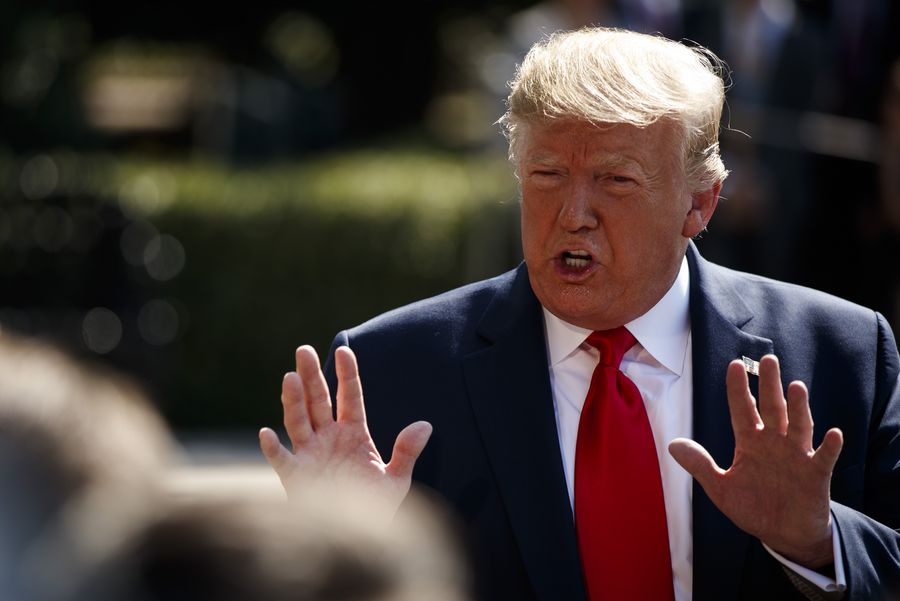
U.S. President Donald Trump speaks to reporters before leaving the White House in Washington D.C., the United States, on Aug. 9, 2019. (Photo by Ting Shen/Xinhua)
The International Monetary Fund in a blog post published Wednesday warned against imposing tariffs, calling it a "counterproductive policy."
WASHINGTON, Aug. 21 (Xinhua) -- Tariffs imposed by the Trump administration amid its ongoing trade disputes with countries around the world are expected to reduce the average U.S. household's income by 580 U.S. dollars by 2020, the non-partisan Congressional Budget Office (CBO) said in a report Wednesday.
The CBO expected that by 2020, changes in U.S. and foreign trade policies since January 2018 will slash real U.S. gross domestic product (GDP) by about 0.3 percent, and that tariffs imposed as part of those trade policies will reduce real income for the average U.S. household by 0.4 percent.
The tariffs, which don't include those of 10 percent on some 300 billion dollars in Chinese goods scheduled to take effect in September and December, will lower real U.S. exports by 1.7 percent by 2020, and see real U.S. imports decrease by 2.6 percent, the agency estimated.
"Tariffs reduce domestic GDP chiefly by raising domestic prices, which reduces the purchasing power of U.S. consumers and increases the cost of business investment," the report said, adding that by 2020, the tariffs will cost average U.S. household 580 dollars in real income based on 2019 dollars.
"We see the direct effects affecting American families and businesses," CBO Director Phillip Swagel said while discussing the report with CNBC. "Tariffs raise the prices they pay and, in effect, decrease the purchasing power."
The International Monetary Fund in a blog post published Wednesday warned against imposing tariffs, calling it a "counterproductive policy." It urged countries including the United States to "reduce budget deficits without sacrificing growth and strengthen the competitiveness of their export industries."
The CBO in its report also predicted that U.S. federal deficit will amount to 960 billion dollars in 2019 and average 1.2 trillion dollars between 2020 and 2029. Over the coming decade, deficits are expected to fluctuate between 4.4 percent and 4.8 percent of GDP, well above the average over the past 50 years, the CBO said.
The agency's projection is for total deficits to reach 12.2 trillion dollars in 2029, 0.8 trillion dollars more than the 11.4 trillion dollars in its baseline projections in May. "Such deficits would be significantly larger than the 2.9 percent of GDP that deficits averaged over the past 50 years."
"The nation's fiscal outlook is challenging," Swagel said in a statement. "Federal debt, which is already high by historical standards, is on an unsustainable course."
U.S. President Donald Trump floated the idea Tuesday of reducing capital-gains taxes and enacting payroll tax cuts. Economists have been expecting an economic recession in one or two years, but Trump said the country is "far from a recession."
In a reversal to Tuesday's remarks he made in the Oval Office, the president told reporters Wednesday that he was not currently looking at any form of tax cut.
"I'm not looking at a tax cut now," Trump said on the South Lawn of the White House. "We don't need it. We have a strong economy."



